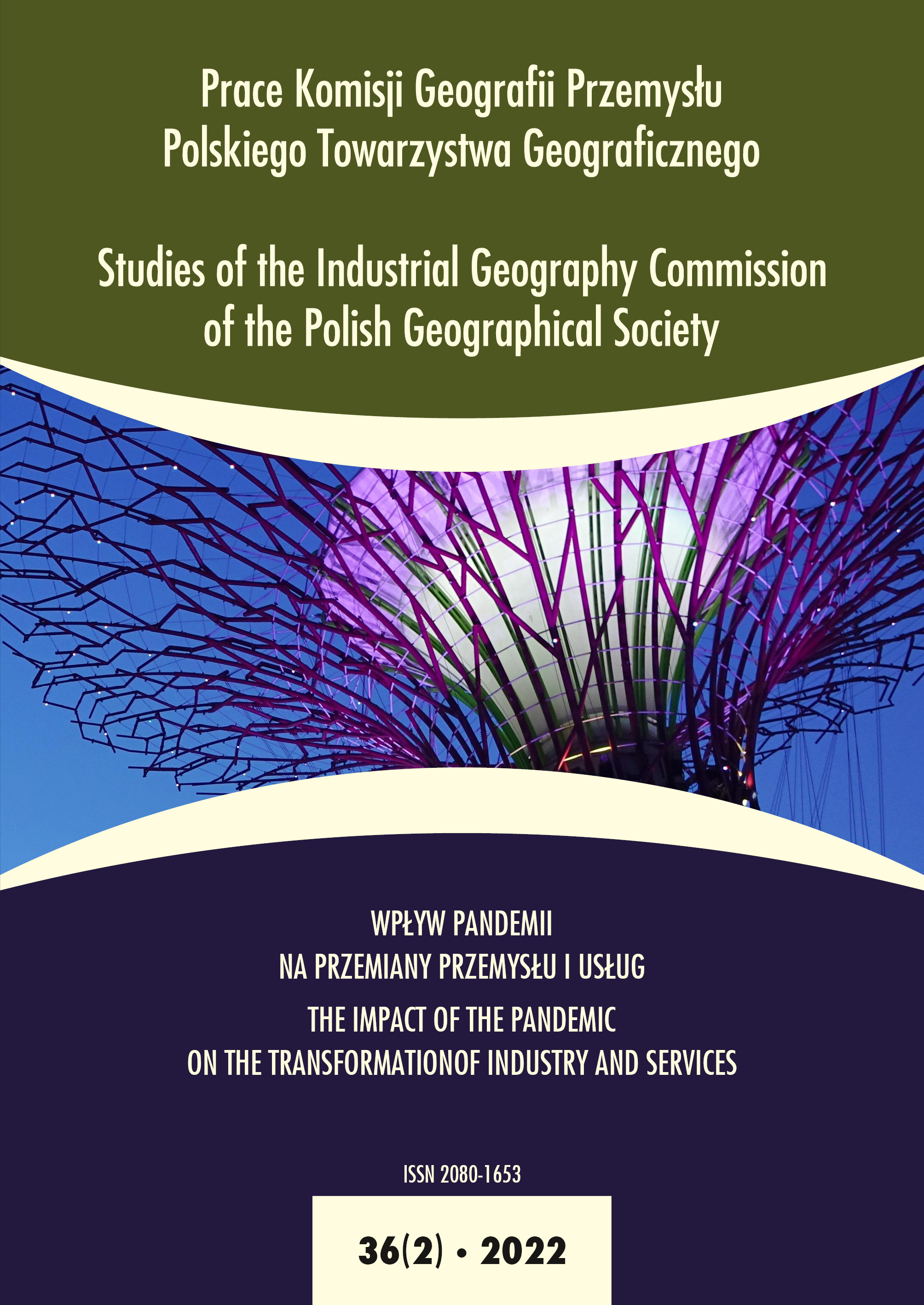COVID-19 pandemic as a stimulator of economic innovation. Analysis in a socio-cultural perspective
DOI:
https://doi.org/10.24917/20801653.362.5Keywords:
innovation, covid-19 pandemic, social change, diffusion of innovationAbstract
The article concerns the issue of socio-cultural determinants of innovation during the COVID-19 pandemic. Therefore, the aim of the article is to identify the factors that are responsible for increasing the chances of innovation during the fight against the SARS-CoV-2 virus. The starting point for the analysis is the statement on the multidimensional, also axiological, determinants of innovation. This statement enables the diagnosis of the chances of pandemic innovation not only in a pragmatic context, but also taking into account its ethical dimension. The result of the analysis is the definition of the “anatomy” of innovation (as a concept) and an indication of the opportunities and dangers of the pandemic innovation. The final result of the analysis is presented in the form of 10 related theses. The basis for their formulation is the sociological theory of innovation, which leads to the final recommendation. It is an incentive to see the non-material dimension of innovation, which enables the appropriate design of innovation policies in times of crisis.
Downloads
Metrics
References
Abernathy, W.J., Clark K.B. (1985). Innovation: Mapping the Winds of Creative Destruction, Research Policy, 14, 1, 3–22.
Bacon, F. (1995). Nowa Atlantyda, przeł. W. Kornatowski i J. Wikarjak, Warszawa: Wydawnictwo Alfa.
Bacon, F. (1950). Novum Organum, przeł. J. Wikarjak, Warszawa: Państwowe Wydawnictwo Naukowe.
Bauman, Z. (2007). Szanse etyki w zglobalizowanym świecie, tłum. J. Konieczny. Kraków: Znak.
Burke, J., Orstein, R. (1999). Ostrze geniuszu. Obosieczne skutki rozwoju cywilizacji, przeł. M. Sachnowski. Warszawa: Philip Wilson.
Eberl, I. (2011). Cystersi. Historia zakonu europejskiego, tłum. P. Włodyga. Kraków: Wydawnictwo Astraia.
Franciszek (2020). Fratelli tutti. Encyklika o braterstwie i przyjaźni społecznej. Pobrane z: https://www.vatican.va/content/francesco/pl/encyclicals/documents/papa‑francesco_20201003_enciclica‑fratelli‑tutti.html (21.04.2022).
Hagen, E. (1962). On the Theory of Social Change. How Economic Growth Begins. Homewood: The Dorsey Press Inc.
Heyerdahl, L.W., Vray, M., Lana, B., Tvardik, N., Gobat, N., Wanat, M., Tonkin‑Crine, S., Anthierens, S., Goossens, H., Giles‑Vernick, T. (2022). Conditionality of COVID-19 vaccine acceptance in European countries, Vaccine, 40, 1191–1197.
Höffe, O. (2004). Mała historia filozofii. Warszawa: PWN.
Inglehart, R. (2003). Kultura a demokracja. W: L.E. Harrison. S.P. Huntington (red.), Kultura ma znaczenie. Jak wartości wpływają na rozwój społeczeństw, tłum. S. Dymczyk. Poznań: Zyski S‑ka.
Johnson, R. (2002). Społeczeństwo ryzyka – implikacje dla uniwersytetów. W: A. Ładyżyński i J. Raińczuk (red.), Uniwersytet – miedzy tradycją a wyzwaniami współczesności. Kraków: Oficyna Wydawnicza Impuls, 11–21.
Kotarbiński, T. (1965). Traktat o dobrej robocie. Wrocław: Zakład Narodowy im. Ossolińskich.
Kozielecki, J. (2002). Transgresja i kultura. Warszawa: Wydawnictwo Akademickie Żak.
Linton, R. (1936). The Study of Man. New York: Appleton‑Century‑Crofts.
Mazzucato, M. (2013). Przedsiębiorcze państwo. Poznań: Paw Druk.
McCloskey, D.N. (2017). Dlaczego ekonomia nie potrafi wyjaśnić współczesnego świata?, przekł.
J. Lewiński, M. Zieliński. Wrocław: Instytut Ludwika von Misesa.
Mumford, L. (2012). Mit maszyny. Pentagon wiedzy, t. 1, tłum. M. Szczubiałka. Warszawa: Wydawnictwo Naukowe PWN.
Ogburn, W.F. (1964). On Culture and Social Change. Selected Papers. Edited and with an Introduction by O.D. Duncan, Chicago: University Press Chicago.
Ogburn, W.F. (1946). The Great Man Versus Social Forces. W: O.D. Duncan, W.F. Ogburn, On Culture and Social Change. Selected Papers. Chicago: University of Chicago Press, 33–43.
Radwan‑Pragłowski, J., Frysztacki, K. (2004). Miłosierdzie i praktyka. Społeczne dzieje pomocy człowiekowi. Katowice: Wydawnictwo Naukowe „Śląsk”.
Rogers, E. (1983). Diffusion of Innovation. New York: The Free Press.
Schumpeter, J. (1938). Business Cycles: A Theoretical, Historical and Statistical Analysis of the Capitalist Process. New York: McGraw‑Hill.
Schumpeter, J. (1960). Teoria rozwoju gospodarczego, tłum. J. Grzywicka. Warszawa: Państwowe Wydawnictwo Naukowe.
Stróżewski, W. (1992). W kręgu wartości. Kraków: Znak.
Veblen, T. (1924). Absentee Ownership and Business Enterprise in Recent Times. The Case of America. London: Allen & Unwin.
Weber, M. (1994). Etyka protestancka a duch kapitalizmu, tłum. J. Miziński. Lublin: Wydawnictwo Test.
Weber, M. (2002). Gospodarka i społeczeństwo. Zarys socjologii rozumiejącej, tłum. D. Lachowska. Warszawa: Wydawnictwo Naukowe PWN.
Wojciszke, B. (2004). Człowiek wśród ludzi. Zarys psychologii społecznej. Warszawa: Scholar.
Zdun, M. (2016). Innowacje. Perspektywa społeczno‑kulturowa. Lublin: Wydawnictwo KUL.
Downloads
Published
How to Cite
Issue
Section
License
Copyright (c) 2022 Studies of the Industrial Geography Commission of the Polish Geographical Society

This work is licensed under a Creative Commons Attribution-NoDerivatives 4.0 International License.
Articles are published under the terms of the Creative Commons License (CC BY-ND 4.0; Attribution– NoDerivs).

